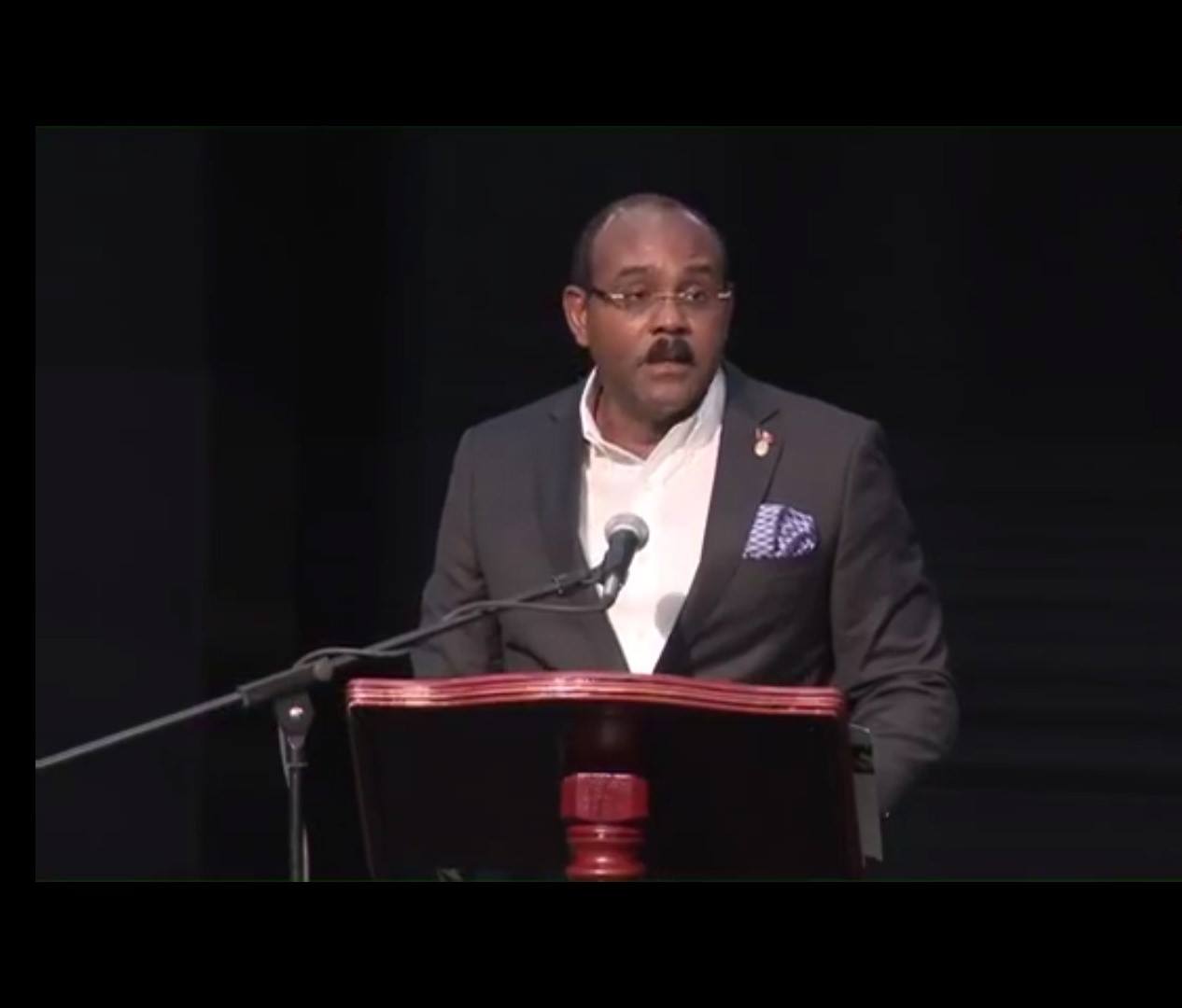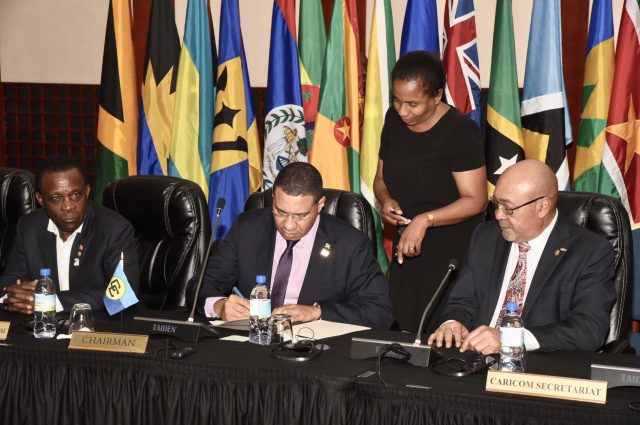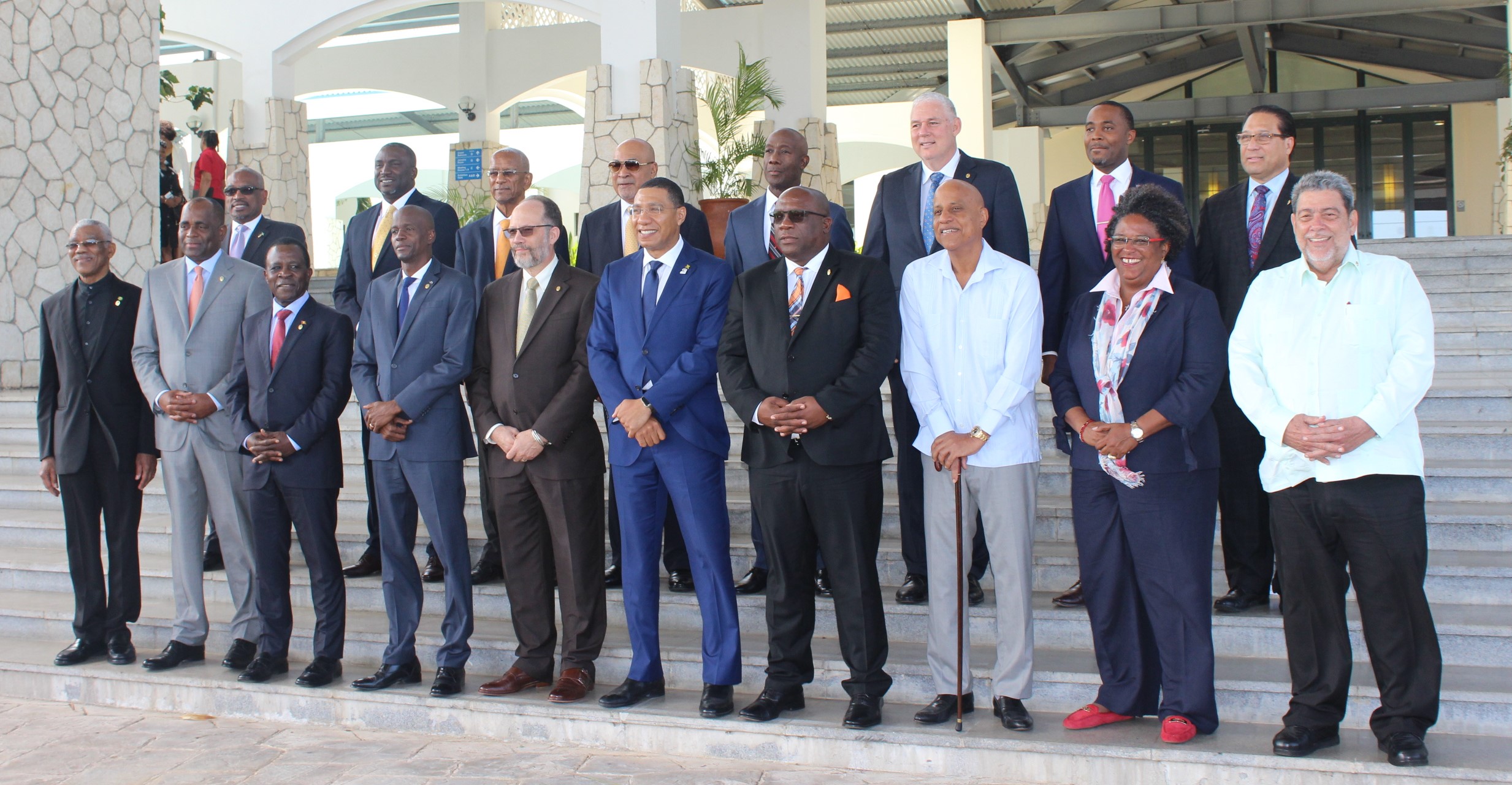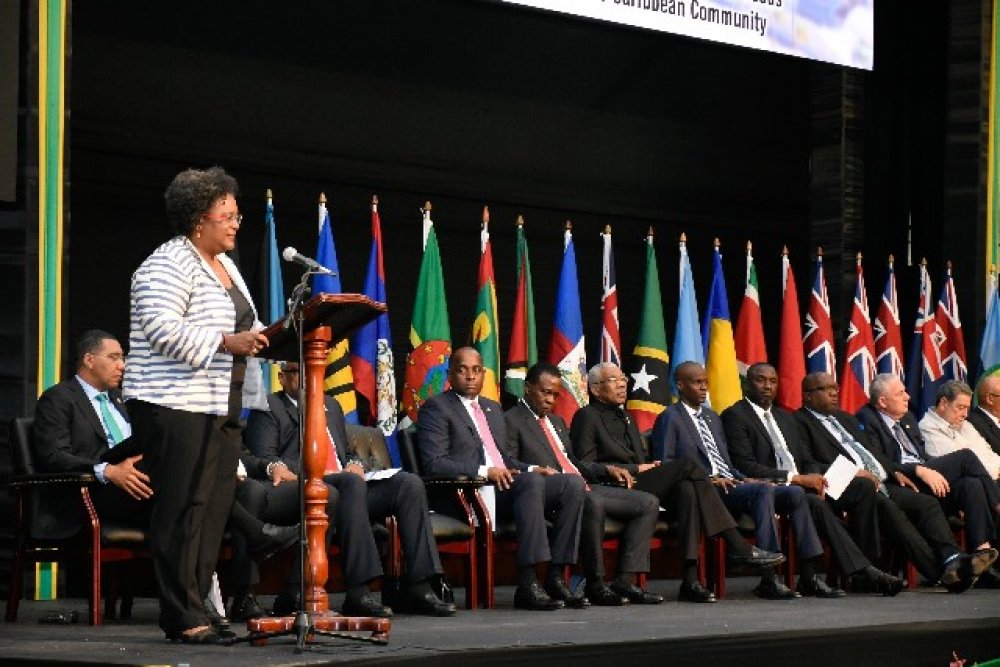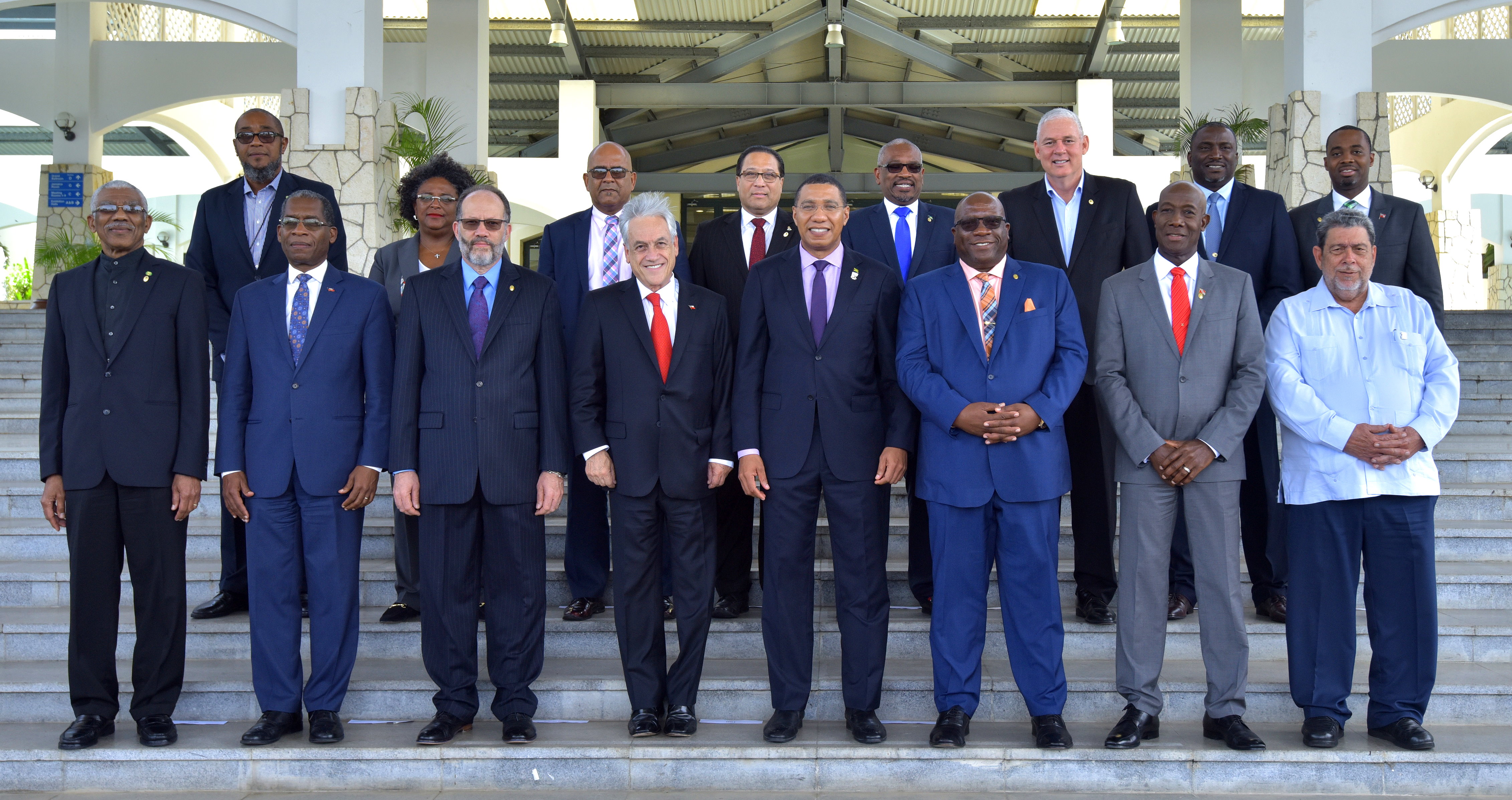Your Excellency the President of Haiti, Jovenel Moïse, Outgoing Chairman of CARICOM
The Most Honourable Prime Minister of Jamaica, Andrew Holness, Incumbent Chairman of CARICOM;
Other distinguished Heads of State and Government;
The Secretary-General of CARICOM, His Excellency Irwin LaRocque;
Honourable Ministers of Government of member countries of CARICOM;
Your Excellencies of the Diplomatic Corps;
Esteemed invited guests; Ladies, gentlemen and the people of our Caribbean Community.
I speak at the opening ceremony of this important Conference of Heads of Government of the Caribbean Community because of my party's electoral victory in general elections on March 22nd that gave me the distinct honour of serving as Prime Minister for a second term.
In seeking the overwhelming mandate that we received, my party gave the people of Antigua and Barbuda the sacred undertaking to maintain the closest possible relations with our neighbouring states in the Caribbean Community in pursuit of our shared objectives.
That is an undertaking that my Government staunchly intends to fulfil.
We acknowledge that the Caribbean is our neighbourhood.
We know that none of our countries can pick-up and leave for a better area.
We recognise that each of our countries has to improve this neighbourhood; make it more prosperous; and raise-up the level of its value.
We are also conscious that no single CARICOM country has the capacity to face the present or future challenges alone, however much national pride and misplaced bigotry might suggest otherwise.
There is an unavoidable interdependence of geographical neighbours that compel co-operation, collaboration and integration to meet development needs.
No country can relocate from its region.
Child of the Caribbean Community
Ladies and Gentlemen,
I am a child of the Caribbean integration cause.
I was born two years after Barrow, Bird and Burnham reignited the flame of regional integration at Dickenson Bay in Antigua in 1965 by launching CARIFTA.
All my conscious life, the light of that flame has illumed my belief that, together, the countries of the Caribbean would rise above their smallness to forge an irresistible unity that would be our collective economic salvation.
But, it has been 53 long years since the flame of integration was re-ignited at Dickenson Bay from the ashes of the West Indian Federation.
Surely, in 53 years, we should have been further along the road to economic integration than we are now.
Others started after us.
Yet, they have galloped ahead, creating for themselves internal markets that have enhanced their domestic production and developing the means to access the markets of others.
The European Union of 9 started after us, but look at the economic force it has begun with a membership of 28 and others knocking on its door.
Overcoming the scepticism of the Caribbean people
Ladies and Gentlemen,
As we convene as leaders of our Caribbean countries, we should not deceive ourselves that the people of our region have great hope for the outcome of our ritual meeting.
After 53 years of crawling through the process of integration, disappointment has replaced hope and scepticism has overwhelmed belief.
But, we have a chance at this Summit to change that situation, and to restore trust and confidence in the people that we can make – and implement – joint decisions that will improve their lives.
That we can do more than talk; we can take action.
After all, we are in Montego Bay where, in a sense, the recognition of our shared condition was first articulated and where the leaders who preceded us seized the vision of our oneness.
It was here in 1947, for instance, that West Indian leaders established a Standing Closer Association Committee to draft a federal constitution.
That the federal government failed was not the fault of its vision or of the validity of its purpose.
If anything, both the vision and the purpose remain compelling.
That is why, despite the siren songs of the separatists among us, the inherent conviction that we can best overcome the challenges that confront us by acting together, has appealed to the angels of our better sense.
The Current Caribbean condition
We have only to consider the circumstances or our countries individual and collective experience to recognise the crucial importance of integration and unity.
The rich countries of the international community might today acknowledge the vulnerability of our small states, but, nonetheless, they deny us the means to overcome it.
We are classified as ineligible for concessional financing because we actually run democracies where the rights of workers are upheld as are improved wages for labour.
The single criterion of per capita income slams-shut the door to bilateral and multilateral grants and other concessional funding.
The resulting difficulty we encounter in accessing international capital markets, forces us to borrow on onerous terms, keeping us in a spiral of debt.
Many of us are now held hostage to accumulating interest rates on commercial debt, incurred to recover from recurring natural disasters or loss of preferential markets.
Yet, the Paris Club, is immune from our appeals for reasonable rescheduling of those debts, including some forgiveness.
And, the natural disasters, caused by Climate Change, to whose creation we made little or no contribution, grow in their frequency and intensity.
All of us, as we meet here, are deeply conscious that we are in the hurricane season.
We each live in fear that many of our countries might be crippled in the coming months, with no meaningful response to our plight from the international community, including those who are the worst perpetrators of Climate Change.
Significantly, we must respond to these developments and their far-reaching implications for our capacity to serve the well-being of our people, at a time of unprecedented change and unpredictability in the global community.
Global rules are under assault, the international system is being weakened, and international law is being ignored.
The Urgency of action
The very difficulties in the international political economy and their acute effects on our region cry out for more, not less integration.
Solutions to the issues
There should be no doubt that one of the most important solutions to the difficult economic circumstances our countries collectively face is the deepening —and widening— of the regional integration process.
And, at the heart of that process must be the realisation of the Caribbean Single Market and Economy (the CSME).
I am heartened that the Honourable Mia Mottley, the newly elected Prime Minister of Barbados, has assumed lead responsibility for the CSME.
Her known commitment to Caribbean integration and her belief in it as a vehicle for the betterment of the Caribbean peoples, together with her record of delivering Caribbean results, encourage me to believe that the brake, which was applied to the CSME in 2011, will now be released and the process will be accelerated.
I do not fool myself, or anyone else, that the process will be easy or swift.
But, I know that it cannot remain on pause.
As the Prime Minister of St Vincent and the Grenadines has so persuasively pointed out:
“CARICOM’s current mode of marking time, at an historical moment of overwhelmingly awesome challenges for our region, which compellingly demands a more profound integration, is mistaken… ‘pausing’ is but a euphemism for standing still, which in a dynamic world is sliding backwards.”
The CSME calls for us to move beyond functional cooperation.
Each of our countries has to commit to, and implement, free movement of goods, people, services, capital and technology.
It is the only way in which our region will overcome the low level of both intra-industry and intraregional trade.
Catering for the burdens placed on the Eastern Caribbean
At the same time, it will have to be recognised that, over the last three decades, smaller members of CARICOM have borne a disproportionate burden in the movement of goods, services and people in the region.
The CSME is likely to increase those burdens, unless compensatory measures are instituted.
Eastern Caribbean countries – the members of the Organisation of Eastern Caribbean States – have absorbed a great number of unskilled labour from Jamaica and Guyana particularly over the last three decades.
By absorbing those numbers of people, we have eased the strain on the economies of Jamaica and Guyana at a time of need.
And that contribution is heightened by the remittances that these migrants send to their home countries.
Additionally, in trade, Eastern Caribbean countries suffer trade deficits with Barbados, Guyana, Jamaica and Trinidad and Tobago.
Incidentally, in the wider context of CARIFORUM, my own country has also absorbed a significant number of nationals of the Dominican Republic which now also enjoys a trade surplus with Antigua and Barbuda.
I mention these realities not in complaint, but in illumination, and to guide our decisions for the future.
I am fully aware that in any economic integration process, especially one that includes a single market, there must be gains and losses.
The realisation of the CSME can be good for us all, as long as we make provision within it for balance in the interest of all.
These are difficult but not intractable problems.
If we approach them with the resolve to make the CSME work in all our interests collectively, I believe we can solve them.
And, as Prime Minister Mottley, takes up the cudgels of this task, I pledge my Government’s support for its realisation.
Regional Transportation
In the context of CSME, as much as in the broader consideration of regional integration, I turn attention to regional transportation.
This single issue causes the greatest irritation to all our peoples.
They are rightly infuriated at the high cost of travel in the region, and the profound difficulties to direct travel between our countries.
Most frustrated of all is our business community.
Even if we solve all the technical issues that permeate establishing the CSME, we will achieve nothing unless we implement the means to transport people and goods across our region.
As far back as 1992, the West Indian Commission made the telling point that: “West Indian integration would wither on the vine and die without adequate sea and air transportation services”.
The Commission went on to say that: “The matter is, in the most profound and fundamental sense, at the very heart of the integration process itself”.
That observation has grown in relevance in the passing years.
The leadership of our Caribbean Community cannot continue to abdicate responsibility for ensuring the availability of reliable and regional air and sea transportation.
We cannot leave it to the private sector anymore than the private sector can leave it to us.
It is a joint responsibility that is a precondition of success for a single market in which our business community moves its goods, and to the fundamental importance of linking the Caribbean people together.
Over the years, this issue has been studied; the studies have been studied; they have been shelved; then dusted and studied again.
So, I say to this meeting:
If we are to manifest our seriousness about a single market, and if we are to convince the Caribbean people that Caribbean integration is real, we must act to establish effective regional transportation even at the cost of a subsidy in its early stages.
The time for talking has passed.
Questions about the Hostile International Environment
Ladies and Gentlemen
The future of our region depends on trust and confidence amongst its leaders, particularly in how we deal with the external community.
It will not be possible for us to strengthen our bonds at home if we weaken them abroad.
Too often in the international arena, our countries have been divided.
Loyalty to each other is sometimes sacrificed on the altar of narrow and short-term self-interest.
Principles, dear to each of us as small states, are set aside to satisfy the agenda of some other nation or group of nations.
In the event, it is our CARICOM collective that suffers.
For we weaken ourselves by our divisions, making it more difficult to regroup to confront the very nations that lure us into convenient and temporary alliances to fight their causes, not our own.
There is no doubt that our region is now challenged by deliberate actions that are destroying our fragile economies.
The already deleterious effects of de-risking and the withdrawal of correspondent banking relations are well-known, as is the frightening prospect that, if these movements continue, our region will be cut-off from the world’s financial and trading system.
The consequences for our economies and our peoples would be nothing short of disastrous.
We cannot allow the unilaterally devised and universally imposed doctrines of the OECD and FATF to be elevated above the welfare of our people and the development of our countries.
Even as I speak, the financial institutions in many of our countries are obliged to begin reporting to almost 100 countries on assets held by their nationals under the OECD’s Common Reporting Standards.
It is a well-nigh impossible task, and, in the event, very expensive, costing us resources we do not have, and likely to cause financial institutions to flee from our region.
Yet, if we fail to comply, we will be branded as aiding money laundering and tax evasion.
To fight these battles, we need to fight collectively.
We need loyalty in our leadership.
We need to stand together in the global community; to cohere not to divide; to serve our collective interest not the interests of others.
Today, I call for a unified Caribbean stand, for collective Caribbean action, to resist and overcome external policies that are crippling our efforts to provide for our people.
Need for Regional Unity
Fellow Heads of Government, Distinguished Ladies and Gentlemen.
I thank you for your tolerance in allowing me to talk at such length on the urgency of renewed regional unity.
We need it now more than ever before.
And we need it with deeper commitment and greater strength as we face challenges in a world where there has been much talk about the problems of small states but little action to solve them.
The task of overcoming our vulnerabilities; of growing our economies despite the odds; of giving our people their rightful share of the world’s bounty will only be possible if we enlarge our strengths by combining them.
We should not now dither or defer.
The urgency is now.
Thank you.
Press ReleasesSpeeches
Address, PM Gaston Browne, 39th Meeting, Conf. of Heads of Govt. of CARICOM, Montego Bay, Jamaica, 4 July, 2018
